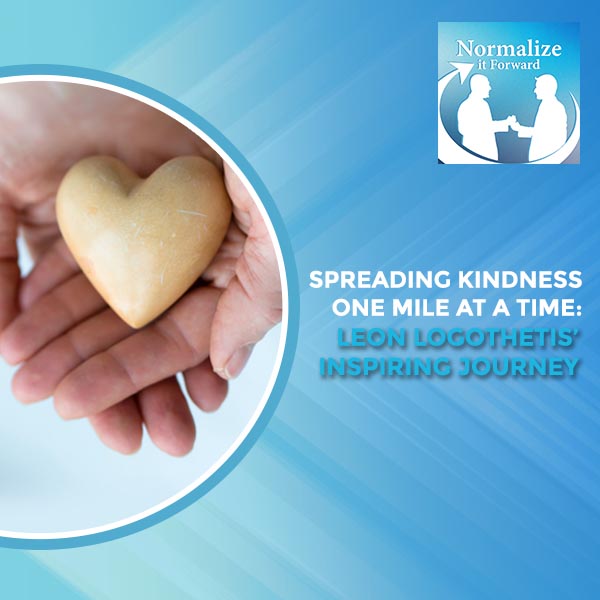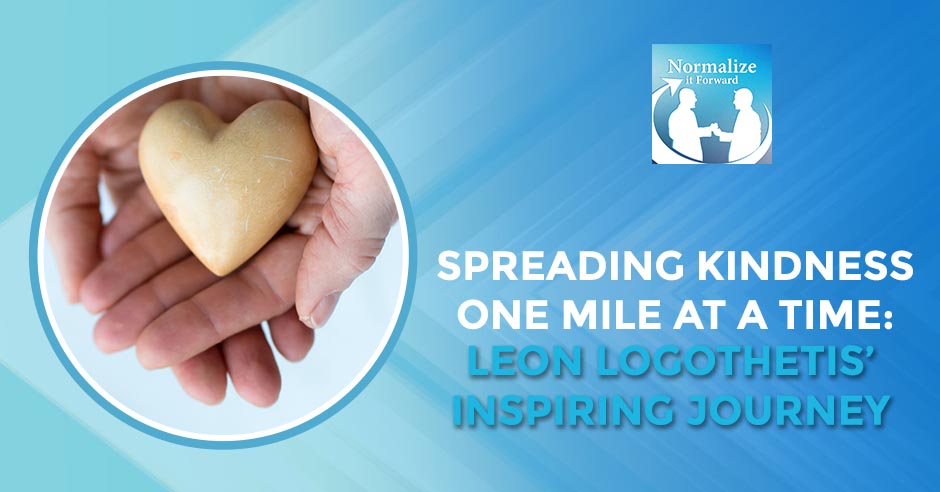
Leon Logothetis, also known as “Leon the Kindness Guy,” is a global adventurer, motivational speaker, and author best known for his work in spreading kindness and human connection. Formerly a successful stockbroker, Leon left his career to embark on a journey around the world, relying solely on the kindness of strangers for food, shelter, and transportation. His experiences led to the creation of the Netflix series The Kindness Diaries, where he shares powerful stories of compassion and generosity. Leon now dedicates his life to inspiring others to lead with kindness, showing how small acts of goodwill can create lasting change in the world.
—
Watch the episode here
Listen to the podcast here
Spreading Kindness One Mile At A Time: Leon Logothetis’ Inspiring Journey
Kindness
We’re joined by Leon. I’m going to allow you to introduce yourself because in all honesty, I’ve read a lot about you but I’m sure I’m going to screw it up somehow by talking about your experiences. Please tell us a little bit about yourself.
First of all, thanks for having me on. I used to be a broker in the City of London. This is going to be the short version. I had everything you could want on the outside but on the inside, I felt very broken. I ended up quitting my job after watching the movie the Motorcycle Diaries, which is about a man traveling around South America relying on kindness.
It inspired me and moved me to realize it was another way to live. I started traveling around the world, relying on kindness, meeting all these amazing people, being inspired and hopefully, inspiring some people along the way. I ended up moving to Los Angeles, did a couple of TV shows, wrote a few books, a documentary and here we are. That’s the very short version.
I appreciate it. I have to say, in our area, we’re not able to get the Kindness Diaries on Discovery Plus but I have done my research and watched many videos of you on YouTube. What an amazing story and what an interesting thing to focus on kindness. Why kindness?
The easy ask to is that when I grew up, I felt a lack of kindness. I always had this urge to go on adventures. I created this show and this life, whereby I went on adventures. It was all about relating to people from a place of the heart, generosity, and love giving and receiving.
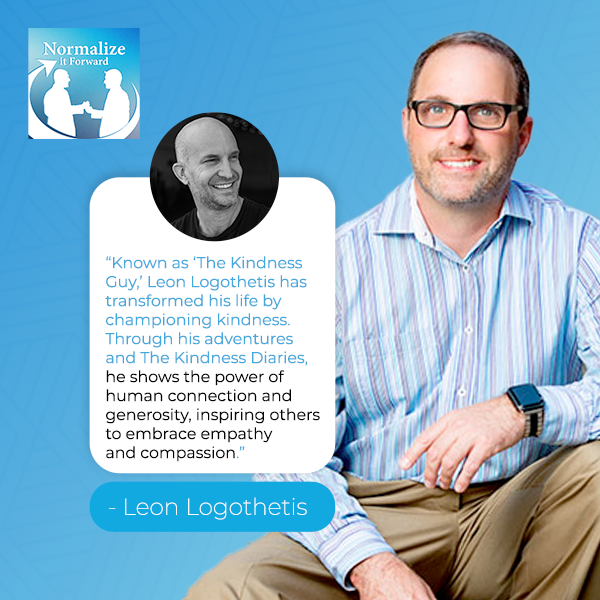
Leon Logothetis, the Kindness Guy, otherwise known on social media. I referenced your show the Kindness Diaries for those of you that are able to view it online. I strongly suggest you do. As I’ve mentioned, I’ve seen a bunch of clips of it on YouTube and it looks fascinating. Very moving. One story after another. I’m not sure if you’re able to sum up your takeaway from all of those experiences. Can you tell us a bit about how that kindness has impacted you?
The Kindness Diaries was when I purchased a vintage emoji bike with a sidecar. I drove it from Los Angeles all the way around the world back to Los Angeles with no money, no food, no gas, and no place to stay. All I had was relying on the kindness of strangers. People always say to me, “What was the one thing you learned?”
I learned many things but the main thing I learned was that we’re all the same irrespective of religion, how much money we have, and how cool we think we are or think we’re not. At base, we just want to be seen, heard and be loved. It took me traveling the world, becoming part of so many different cultures and meeting so many different people to realize that one simple thing. That we’re at the base of our humanity the same.
Super well played. Very hard to sum up but you did a great job now doing that and I agree. In the world we live in, there’s so much conflict, opinion, and difference. I always find and always say this out loud even in session as a family therapist to patients of mine, “Kindness is free.” It doesn’t cost you a dime. It’s an option that so many of us overlook. The core piece that I took away from watching so many of your videos is just that basicness of being a human being and recognizing that, as you said, we all just want to be seen and not overlooked and treated well.
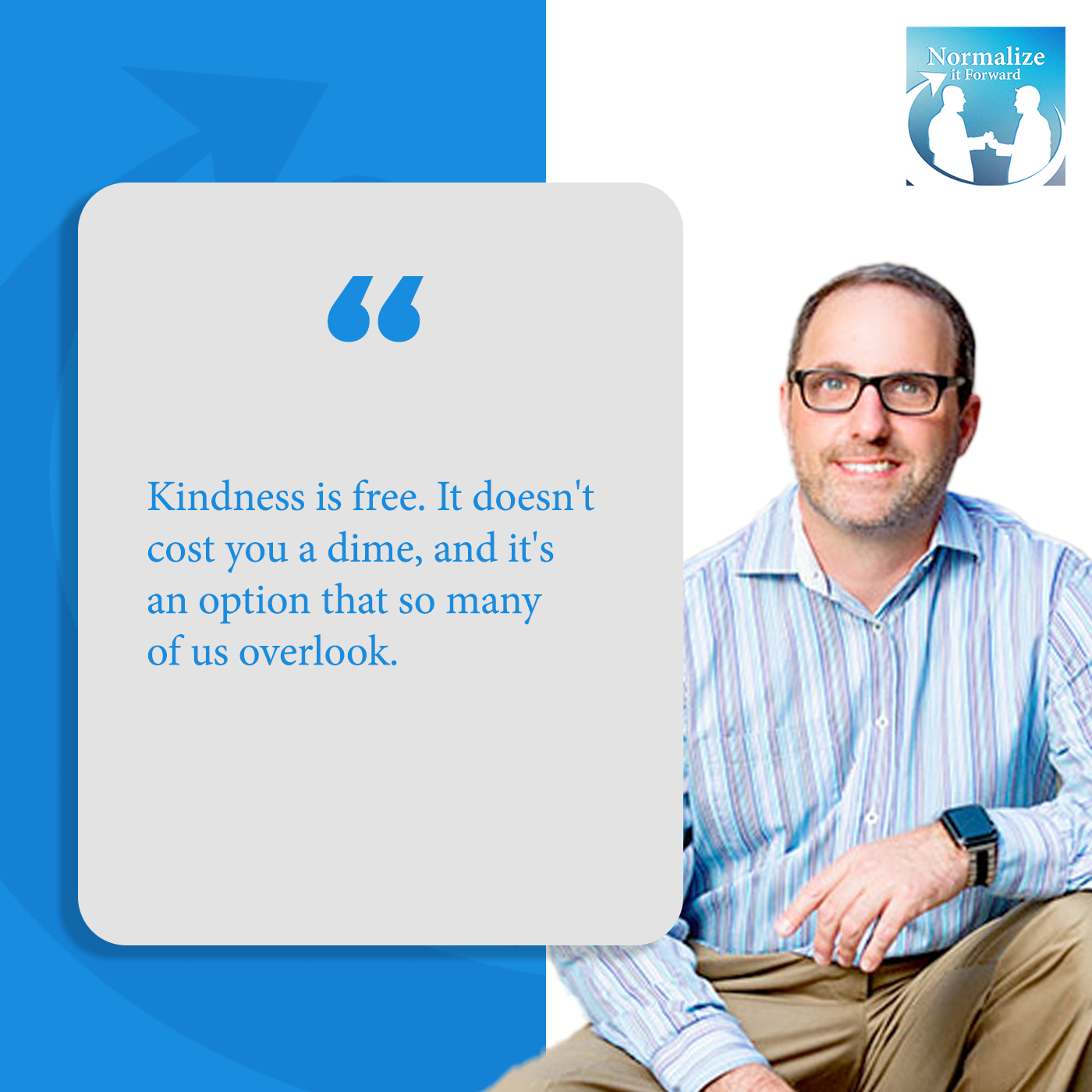
Often, that option is sitting right there in front of us. I applaud you. Your work that you’ve put together, your Kindness Diaries in general, which I just heard was a proof for season 3. Congratulations. Your general demeanor around this topic, Leon, is admirable. I think there’s so much to this conversation around kindness that again people overlook. Yet, here we are talking about mental health and wellness. To me, it’s one of the pillars that can’t be overlooked because without kindness, we don’t have that connection with other people.
We all know what it feels like to be treated in a kind way, hopefully. We all certainly know how it feels to be treated in an unkind way. No one’s perfect. This isn’t about Leon being a perfect human being and being the kindest guy and always being kind. Sometimes, I’m not. That’s just life. It’s about making a commitment to how you show up. Showing up as best as you can and as often as you can.
Self-Care
I love the way you put that. It brings us into one of the large topics I talk about here is self-care, what is self-care and what does that mean to you. Can I throw that at you? What does self-care mean to you, Leon?
Self-care is treating myself the way I would want to treat someone else. Share on XTreating myself in a way that I would want to treat someone else. Often, we treat ourselves in ways that we would never let someone else treat us, calm, meditative, with love, with respect, dignity and grace. It doesn’t always happen. Sometimes, I talk to myself, I’ll wake up and I’ll do the opposite of that. I’ll be like, “If someone else treated me this way, would I accept that? No, so why are you doing it yourself?”
I like how you said that. It feels like an option. As you mentioned a moment ago, it’s a work in progress for all of us. As long as we’re on that track and we’re working toward it. As long as we’re aware of it and we see it as an option. We can always change course if we need to and as you said, what a great question. Why would we allow ourselves to do that if we wouldn’t allow other people to? What a great point.
From my point of view, Leon, I’m a family therapist. I see a lot of individuals in my office, mostly young adults and normalize it forward is to me was created based on the concept of so many young people not doing these things. We as older adults need to be role models and get young people to recognize that these are achievable things. These are options and choices that we all can be making. Honestly, if we don’t, our mental health suffers.
Mental Health
If we’re not taking good care, not getting good sleep, not getting some physical activity, and not eating decently, our mental health is impacted. Therefore, we’re not feeling so good about ourselves. That brings me to my next question to you and that is mental health. We hear that phrase thrown around a lot. What do you think of when you hear the phrase metal health, Leon?
Most of us or many of us do not have a good relationship with our mental health meaning that we’re broken. Society has broken us in many ways, some more so than others. If we can have the desire to make our mental health as good as we can, then things will change. Most of us don’t even focus on our mental health. We only focus on it when we’re broken and shattered into millions of little pieces. Whereby, mental health is a daily thing that we have to look at and deal with. Sometimes, it feels so insurmountable. We don’t deal with it until it’s too late or not necessarily too late but it’s at a point where it’s become very difficult to deal with.
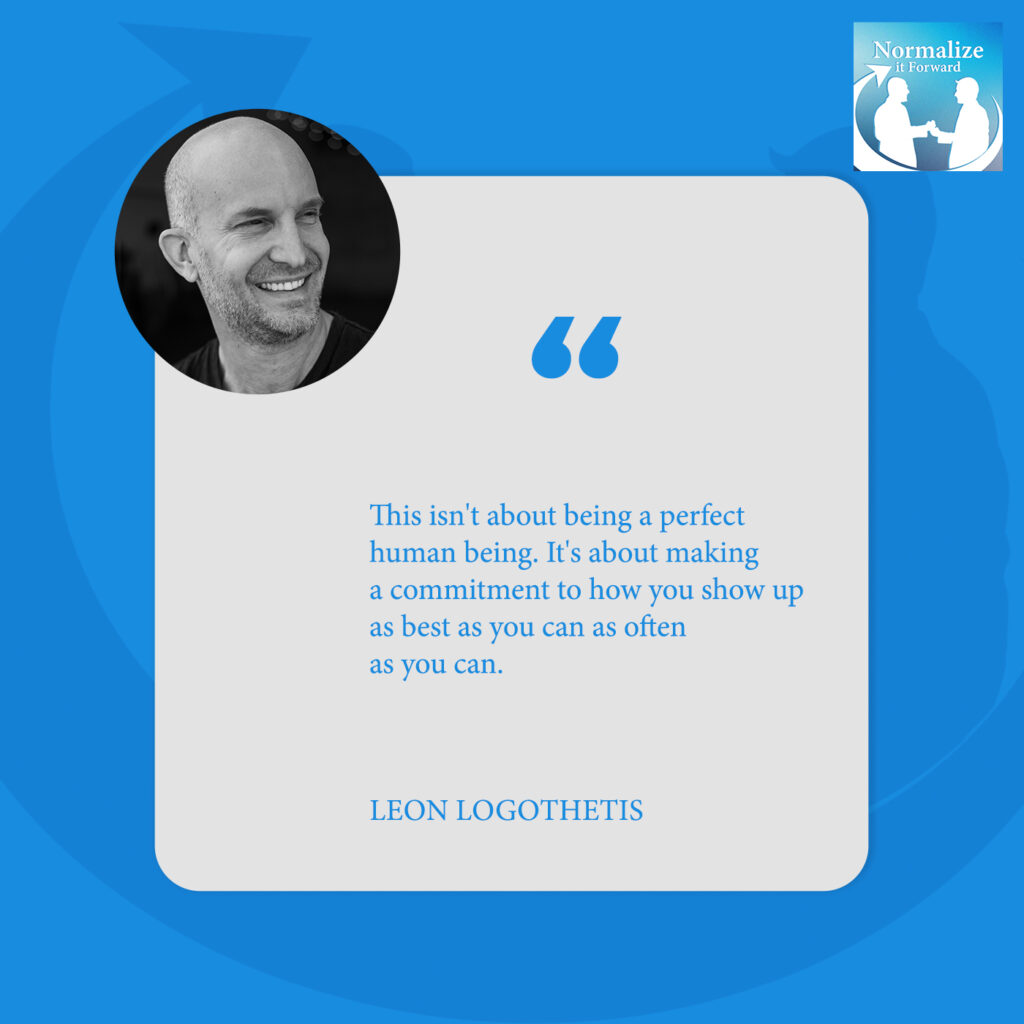
Certainly, with young people. I see that all the time. When I get a call from a parent and they say things to me like, “This, this, and this already happened.” “My son has failed out of school and their home.” One of my first thoughts is, “Why didn’t you call me three months ago?” You’re 100% right, most people don’t want to focus on their mental health until they have no choice or until they have to. You made a choice to leave an occupational path because of an inner desire that you had to change things up. Can you talk to us a little bit about that?
It goes back to what I said about the mental health piece. It became so desperate internally that I felt like I had no choice. That was a good thing because had it not become that desperate, I probably would still be doing it but now at this point, there would be a moment where it would all implode. It was something that I felt very strongly about. I wanted to live as peacefully, as calmly, and as freely as I possibly could and I certainly wasn’t doing that. It was like the pain that pushed me. The pain pushed me to change.
I’m thankful. I think many people are thankful, Leon, because you’ve done a lot of amazing things since then. Let’s not overlook the fact that just showing us the kindness in other people and where that exists all over the world and the opportunity where we all have. Even on a daily basis to hold the door or to say something kind or to be complementary to somebody and the impact that those words have on a person. Sometimes sustained throughout the rest of their day or even further than that.
I think about the impact of the unkind words and turning the news on and being told that we’re different and that person is a disgrace or whatever it is. It happens all the time. We are being bombarded with negativity. Therefore, that’s how we are living.
Think about the impact of unkind words. We are being bombarded with negativity, and therefore that's how we are living. Share on XWellness
I think you’re right. Here we are, we’re progressing in the states here toward another election. I do worry about that. I worry about how that message, those negative messages impact not only adults but also young adults and their general wellbeing. Wellness is a topic that is broad. Wellness and mental health, it’s in there. There’s lots of things that fit in there but wellness is one of those topics that’s super broad.
As you mentioned, people take care of certain aspects of their wellness. They are certainly things that are overlooked with regards to wellness. When you think about freeing yourself, your journey and things that you’ve learned through other people, when you think about that word wellness and the importance of it. What comes to mind?
There’s physical wellness, so looking after yourself physically. There’s mental wellness. The chances are, if you go to the movies and watch a horror movie. You’re going to come out not feeling particularly good. If you go to the movie and watch a movie about love, humanity and about hope. You’re going to feel better. Be very careful what you put into your system. We put a lot of bad stuff into our system without even realizing what we’re doing.
These things alone. These things are social media. I use social media for my business, I’m there. Some of the things I come across are just disturbing. You think about what that does to a young person’s psyche. They’re just looking at it. Unfortunately, this society was different many years ago. We were in school. Students now, over 70% of kids have tremendous amounts of anxiety. Very few of those kids get helped.
To your point from earlier, something like 11% of kids nationally get assistance. A big part of that is based on what you said earlier, which is kids wait and wait until things get bad. I’m not even so sure it’s just kids. Adults sometimes do that as well. I’ll have an adult come into my office and they’re clearly in mouth pain. I’ll say to them, “What’s wrong?” They say, “My mouth has been bothering me for weeks.” I said, “Have you been to the dentist?” “Not yet.” “Why not? What are you waiting for?” That happens with physical and mental health. In addition to people waiting, are there other reasons in your mind that people don’t address these things that they let them fester?
It’s painful to address it. It’s easy to turn on Netflix.
That’s for sure.
You look at your phone. It’s easier to do that or to eat something or to take a drink or to do a drug than to sit and face yourself. That’s the hardest thing to do. That’s why people don’t do it. Also, we live in a culture where it’s instant gratification. You know better than I do that to heal doesn’t happen instantly. It takes time and dedication. That’s why people don’t do it and that’s why the people who do it are the ones who are in desperate need more often than not.
That’s a great point and often overlooked, the simplicity of how hard it is. Caring for yourself has gotten a bad name over the years. When you use the word selfish, a lot of people think negatively. How do we explain things like going to our doctor for an annual exam or going and getting our teeth cleaned or doing things that we’re supposed to do to maintain ourselves. Those are positive things and yet sometimes people label those things in a very selfish manner. It’s confusing.
As a young adult, what do I do and what do I not do? You’re right, I do think we live in a world where we avoid things that are hard. Things that take a lot of energy and take a lot of our time, even though they’re important. We tend to avoid those things. You’re 100%. It brings me back to this show and the conversation around mental health, wellness, and the importance of us talking about it. The importance of us trying to figure out where we start. Maybe kindness, Leon, is the place we start because kindness is one of those things.
Even if we’re feeling bad, we can always send a kind message to somebody. Whether it be electronically or out loud or even through our behavior. As I said, over the years, I’m a door holder. I like to hold doors for people, especially when I go get my coffee. I’m just amazed at people’s response by holding the door and waiting there for a bit. They’re so profusely excited when they get to the door. I’m like, “I didn’t do much.” They’re like, “You did.”
Advice For Young Adults
Those actions that people could be doing, those kind acts where it doesn’t take much but as you said, it could set the course for that person for the rest of the day and maybe even longer. That’s a great place for us to start. If you were talking directly to a young adult nowadays, picture a 19-year-old or a 20-year-old or a 21-year-old person who’s struggling with some of these things.
Maybe in a way where they’re feeling broken. Maybe in a way where they’re contemplating. What should they do about this? I feel Leon, so many people in life I’ve been given such good suggestions from people over the years. I’ve had some good mentors guide me and make suggestions. I’m wondering what suggestions might you offer a young person if they’re in that particular spot?
Find one person who you feel safe with and share everything with them because part of the challenge is we don’t speak. We let it fester and then it destroys us. Maybe you don’t want to share everything. That’s okay, but share something. Share. Let it out.
Find one person with whom you feel safe and share everything with them. Maybe you don't want to share everything, and that's okay, but share something. Let it out. Share on XThat’s immense. That’s a great suggestion and especially for men because I find that so often men hold it all in. For some reason young men, they’ve been given that message if that’s what we’re supposed to do. As a human being, I don’t care if you’re male female. To me, our bodies don’t like that. At some point, our cup runs over. We can’t hold all of that in but I love what you said. Whether it’s a friend, a therapist, a parent, a coach, or a teacher. It doesn’t even matter as long as they’re willing to listen. In one word, share. I love that.
Share your pain.
I have a funny feeling you have lots of stories that you’ve learned over the years in your travels, Leon. We’d love to one day pick your brain and hear about them. In all honesty, in watching each of your experiences and I’m sitting at my computer listening to what you said and what they’ve said, every single one of them touched me. Every single one of them just brought emotion out.
I would encourage all of our listeners to go on and do their homework and watch your videos and your show because to me it teaches a lot about humanity, about people and what brings us all together as you started with. Thank you for that. I appreciate that. One of the other things I like to do in these episodes is just because I want the conversation to continue. I know I’m putting him on the spot when I do this, but I asked that if you have somebody and your network, whether it be a friend, a relative or a co-worker that you would like to nominate to normalize it forward to keep the conversation going. I would love to interview that person. Anybody come to mind, Leon?
I do. We’ve been working on a documentary called the Kindness Within. It will be coming out soon. The guy I have in mind was the writer and one of the producers. He’s one of the wisest and kindest men I know. His name is Alpha. I would love to put you in touch with him so you can interview him.
I look forward to that and have you shoot me as information offline. Is it too early to ask, where can our viewers watch this when it does come out?
The movie hasn’t come out yet. If you go to KindnessWithin.com, you can see the trailer and you can see everything that the movies are about.
I can’t encourage our readers enough to do that. you’re a unique individual, Leon. You’re a trailblazer around this concept, what a basic easy important concept of kindness. Thank you so much for joining us and for your time and energy. I appreciate it.
No worries. Thanks for having me.
We’ll talk to you soon. Take care.

